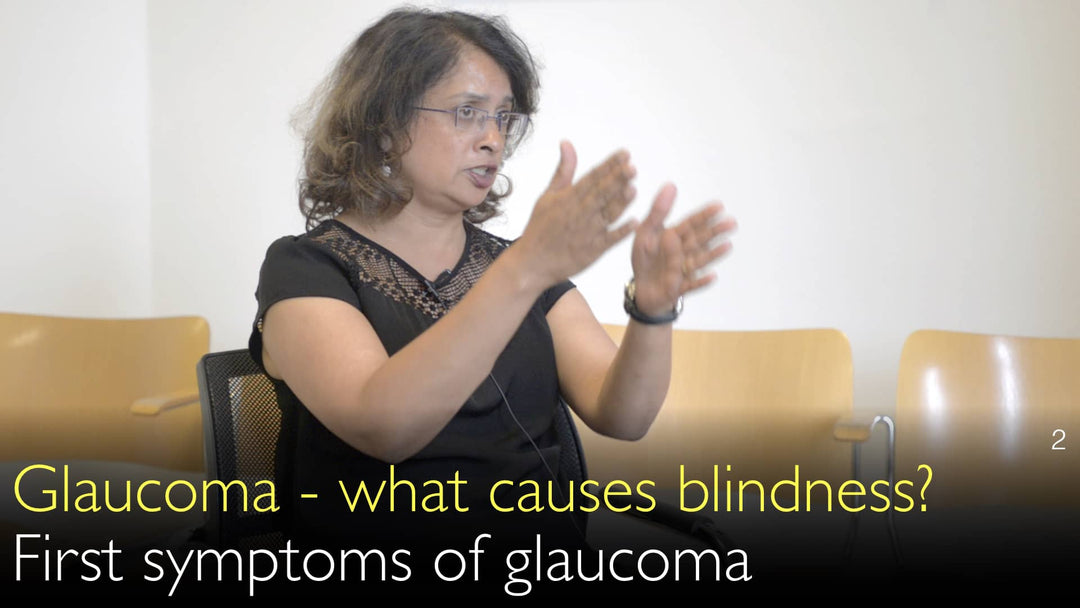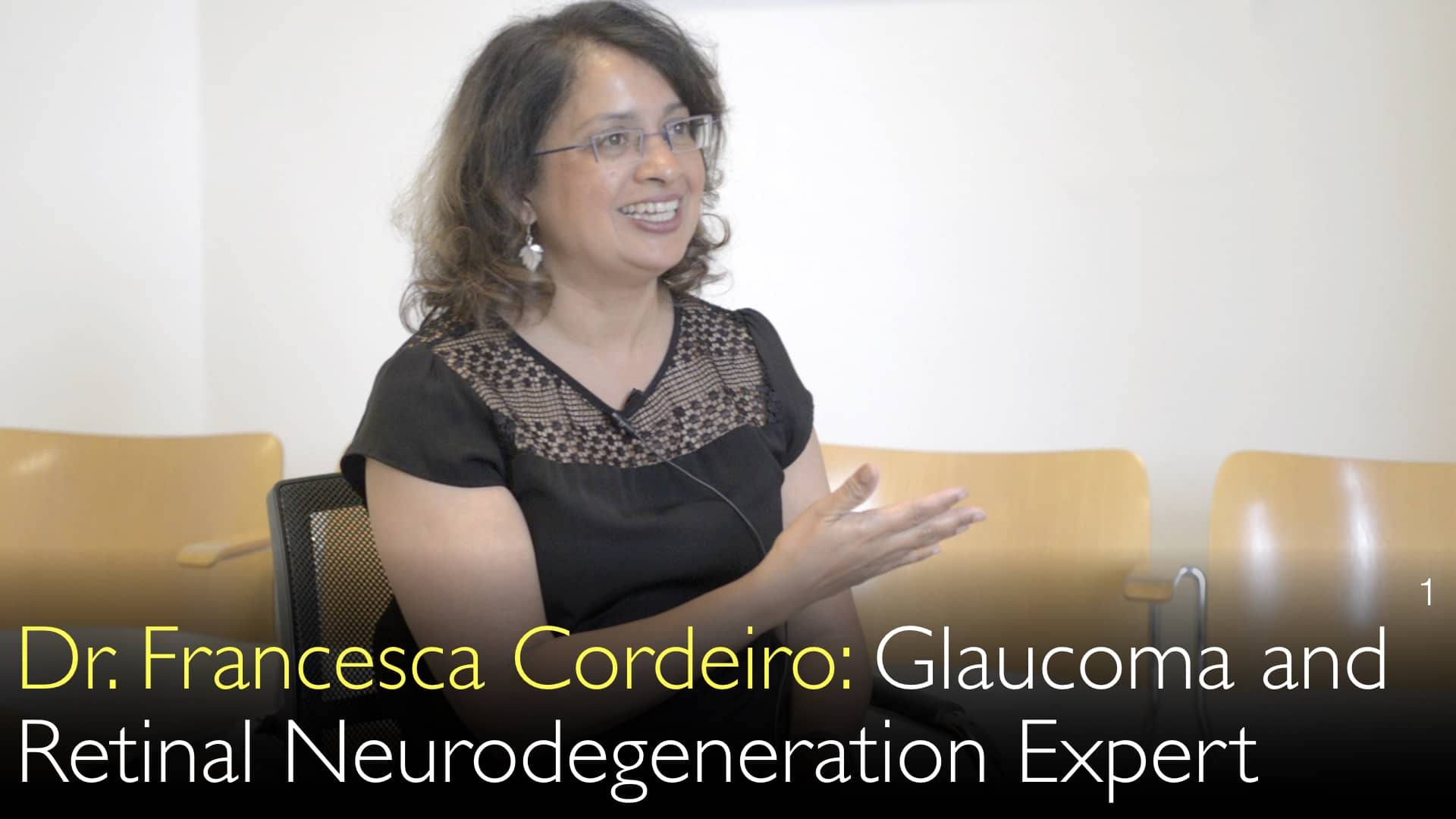Neurodegeneraation ja glaukooman alan johtava asiantuntija, lääketieteen tohtori Francesca Cordeiro, selittää, miten glaukooma johtaa sokeutumiseen tuhoamalla verkkokalvon hermosoluja – prosessissa, jossa varhaisia oireita usein ei esiinny. Hän kuvailee yksityiskohtaisesti, miksi kohonnut silmänpaine on riskitekijä, ei itse sairauden syy, ja korostaa tämän ”näön hiljaisen varkaan” seulonnan ratkaisevan tärkeää roolia perheissä, joissa on glaukoomaa esiintynyt, estääkseen peruuttamattoman näönmenetyksen.
Glaukooma: Sokeuden syyt ja varhainen toteaminen
Hyppää kohtaan
- Mikä on glaukooma? Neurodegeneratiivinen silmäsairaus
- Mikä aiheuttaa sokeuden glaukoomassa?
- Glaukooman ensimmäiset oireet: Miksi sitä kutsutaan hiljaiseksi varkaaksi
- Glaukooman seulonnan kriittinen merkitys
- Miten glaukooma diagnosoidaan: Paine, kuvantaminen ja näkökenttä
- Perhehistoria ja muut glaukooman riskitekijät
- Sokeuden ehkäisy glaukoomassa
Mikä on glaukooma? Neurodegeneratiivinen silmäsairaus
Glaukooma on pohjimmiltaan silmän neurodegeneratiivinen sairaus, eikä pelkkä kohonnut silmänpaine. Kuten tohtori Francesca Cordeiro, MD, selventää, kohonnut silmänpaine on merkittävä riskitekijä, joka vaikuttaa sairauden kulkuun, mutta ei ole sen juurisyy. Sairaus ilmenee tiettyjen verkkokalvon hermosolujen etenevänä kuolemisena, mikä johtaa ajan myötä peruuttamattomaan näön menetykseen. Tämä nykyaikainen käsitys siirtää painopisteen paineen hoidosta neurosuojaan.
Mikä aiheuttaa sokeuden glaukoomassa?
Sokeus glaukoomassa johtuu verkkokalvon ganglionisolujen kuolemasta. Tohtori Francesca Cordeiro, MD, selittää, että nämä erikoistuneet hermosolut vastaavat visuaalisen tiedon siirtämisestä silmästä aivoihin. Kun nämä solut kuolevat ajan myötä sairausprosessin vuoksi, ne aiheuttavat pysyviä sokeita pisteitä henkilön näkökentässä. Nämä pisteet laajenevat ja sulautuvat vähitellen yhteen, mikä johtaa lopulta merkittävään näön vajaatoimintaan ja edistyneissä tapauksissa täydelliseen sokeuteen.
Glaukooman ensimmäiset oireet: Miksi sitä kutsutaan hiljaiseksi varkaaksi
Glaukooma on pahamaineisen oireeton varhaisvaiheissaan, minkä vuoksi sitä kutsutaan "näön hiljaiseksi varkaaksi". Tohtori Francesca Cordeiro, MD, huomauttaa, että potilaat eivät yleensä huomaa aluksi mitään vialla. Tämä johtuu siitä, että aivot käyttävät kehittyneitä kompensointimekanismeja "täyttämään" verkkokalvon kuolevien solujen aiheuttamat näköaukot. Henkilö saattaa olla täysin tietämätön näkönsä heikkenemisestä, kunnes vaurio on vakava ja keskeinen näkö vaikutettu, usein vasta seulontatestin yhteydessä.
Glaukooman seulonnan kriittinen merkitys
Koska glaukoomalla ei ole varhaisoireita, proaktiivinen seulonta on ainoa tapa havaita sairaus ennen merkittävää näönmenetystä. Tohtori Francesca Cordeiro, MD, korostaa, että tämä on ratkaisevan tärkeää sokeuden ehkäisyssä. Glaukooman oireettomuudella on käytännön seurauksia; tutkimukset osoittavat, että glaukoomapotilailla on enemmän liikenneonnettomuuksia, koska heidän aivonsa saattavat täyttää sokean pisteen, aiheuttaen vaarojen, kuten tien yli juoksevan lapsen, huomaamatta jäämisen. Säännölliset silmätarkastukset ovat välttämättömiä varhaiseen puuttumiseen.
Miten glaukooma diagnosoidaan: Paine, kuvantaminen ja näkökenttä
Glaukooman diagnosointi edellyttää monipuolista lähestymistapaa. Kuten tohtori Cordeiro esittää, optometristi tai oftalmologi mittaa silmänpaineen, vaikka se ei olekaan lopullinen diagnostinen kriteeri. He myös tarkastavat silmänpohjan oftalmoskoopilla arvioidakseen näköhermon terveyttä ja vaurioiden merkkejä. Kuvantamistestit mittaavat näköhermokerroksen paksuutta. Toiminnallinen kultainen standardi on kuitenkin näkökenttätesti, jossa potilas painaa nappia nähdessään valon välähdyksiä sivu näössään kartoittaakseen mahdollisia sokeita pisteitä.
Perhehistoria ja muut glaukooman riskitekijät
Ensisijainen riskitekijä glaukooman kehittymiselle on sairauden perhehistoria. Tohtori Francesca Cordeiro, MD, toteaa, että glaukoomapotilaan ensimmäisen asteen sukulaisilla on paljon suurempi riski. Tämän vuoksi monet terveydenhuoltojärjestelmät tarjoavat näille henkilöille ilmaisia näöntarkastuksia. Vaikka korkea silmänpaine on suuri muokattavissa oleva riskitekijä, muihin tekijöihin kuuluvat edistynyt ikä, tietyt sairaudet kuten diabetes ja äärimmäinen likinäköisyys. Näiden riskien ymmärtäminen auttaa tunnistamaan, kenellä tulisi olla erityisen tarkkaavainen seulonnasta.
Sokeuden ehkäisy glaukoomassa
Glaukooman hoidon tavoitteena on ehkäistä sokeus hidastamalla tai pysäyttämällä sairauden eteneminen. Kuten tohtori Francesca Cordeiro, MD, selittää, tämä edellyttää, että potilaat käyvät oftalmologilla varhain, kauan ennen oireiden ilmenemistä. Vaikka nykyistä näönmenetystä ei voida peruuttaa, nykyiset hoidot – mukaan lukien lääkemääräiset silmätipat, laserhoito ja leikkaus – pyrkivät alentamaan silmänpainetta ja suojelemaan jäljellä olevia verkkokalvon ganglionisoluja kuolemalta. Varhainen toteaminen säännöllisen seulonnan kautta on tehokkain työkalu näön säilyttämiseen ja elämänlaadun ylläpitoon.
Koko transkriptio
Tohtori Francesca Cordeiro, MD: Glaukooma määritellään usein korkeaksi silmänpaineeksi, mutta se ei ole glaukooman syy. Kohonnut silmänpaine on vain siihen liittyvä riskitekijä, joka vaikuttaa sairauteen. Glaukooma on neurodegeneratiivinen sairaus. Verkkokalvon hermosolut alkavat kuolla.
Tohtori Anton Titov, MD: Aloitetaan keskustelu glaukoomasta. Glaukooma johtaa kohonneeseen silmänpaineeseen. Se on usein hiljainen silmäsairaus, kunnes potilaat sokeutuvat. Kun glaukoomapotilaat sokeutuvat, se on merkittävä vamma. Mikä aiheuttaa sokeuden glaukoomassa, kun silmänpaine on kohonnut?
Tohtori Francesca Cordeiro, MD: Käsitys korkeasta paineesta glaukooman syynä on muuttunut ajan myötä. Sanomme nyt, että kohonnut silmänpaine on riskitekijä. Se ei ole glaukooman diagnoosikriteeri. Uskomme nyt, että glaukooma on enemmän neuropatiaa. Se on hermosilmäsairaus. Silmänpaine voi vaikuttaa siihen, miten potilas on vaikutettu.
Mitä tapahtuu: silmän hermosolut ovat erikoistuneita. Näitä hermosoluja kutsutaan verkkokalvon ganglionisoluiksi. Nämä solut kuolevat ajan myötä glaukoomassa. Se johtaa glaukoomassa kehittyvään näön menetykseen.
Tohtori Anton Titov, MD: Miten sokeus kehittyy glaukoomassa? Mitkä ovat glaukoomapotilaiden ensimmäiset huomaamat oireet? Mitä oireita potilaat huomaavat, jos heillä on kohonnut silmänpaine?
Tohtori Francesca Cordeiro, MD: Glaukooman erikoisuus on, että siinä ei ole oireita. Siksi sitä kutsutaan näön hiljaiseksi varkaaksi. Potilaat eivät tunnista glaukoomaa, koska sitä on mahdotonta tietää. Aivosi kompensoivat. Erityiset kompensointimekanismit täyttävät tiedon, mistä tiedämme nykyään paljon enemmän.
Se tarkoittaa, että missä et näe asioita, aivot paikkaavat puuttuvaa tietoa. Aivot täyttävät näkömenetyksen aiheuttamat aukot. Potilaana et tietäisi sairaudestasi. Se on yksi syy miksi liikenneonnettomuuksia on yhä enemmän. Glaukoomapotilaat joutuvat useammin liikenneonnettomuuksiin.
Maailmalla tehdään hienoa tutkimusta. Se osoittaa melko selvästi, että koska aivosi täyttävät asioita, saatat jäädä huomaamatta lasta, joka juoksee tietä yli. Joskus se sattuu olemaan yhdellä alueella, jonka aivosi ovat täyttäneet, mutta et ole itse asiassa pystynyt näkemään.
Mitä on tehtävä, kun kyse on oireettomasta ja hiljaisesta silmäsairaudesta? Potilaalle on löydettävä tapoja sen havaitsemiseksi. Siinä glaukooman seulonta tulee kuvaan. Tässä maassa potilaille tarjotaan muun muassa glaukooman seulontaa.
Tiedämme, että jos sinulla on sairauden perhehistoria, olet paljon suuremmassa glaukoomariskiissä kuin ilman. Erityisesti jos olet glaukoomapotilaan ensimmäisen asteen sukulainen. Näille potilaille tarjotaan ilmaisia näöntarkastuksia.
Mitä näöntarkastukset tekevät, silmänpaineen mittauksen lisäksi – kohonnut silmänpaine on glaukooman riskitekijä, mutta ei itse asiassa diagnoosikriteeri – ne tarkistavat, onko silmänpohjassa hermovaurioita. Saatat olla tuttu tämän kanssa. Kun menet optikolle tai optometris





